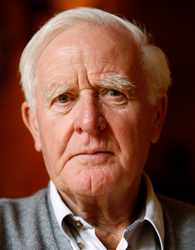Preeminent secret-agent-turned-spy-novelist, John le Carré depicts the darker side of the lives of secret agents.
John Le Carré’s Early Days
John le Carré was born David John Moore Cornwell in Dorset, England, on October 19, 1931. Cornwell’s father, Ronnie, was a small-time criminal and gambler who was eventually jailed for insurance fraud. When Ronnie Cornwell was sent to jail, Le Carré’s mother, Olive, ran off with another man. Le Carré, just five 5 old at the time, and his older brother spent the rest of their formative years being passed among relatives and boarding schools. Le Carré would not see his mother again until he was 21 years old.
At 16, Le Carré ran away to Bern, Switzerland, where he attended university for two years, supporting himself with odd jobs. He was drafted into the British army in 1950, where his fluency in German landed him a post in Austria working with the intelligence corps. After serving in the army, Le Carré attended Oxford University, graduating in 1956 with a degree in modern languages. Upon graduation, Le Carré spent two years as a language tutor at Eton before he joined MI5. Le Carré was sent to West Germany in 1959 as an employee for the British Foreign Service. In his three years there, he moved from MI5 to MI6 and spent time in Berlin.
Sources in this Story
- People magazine: John le Carré
- The Atlantic: The Double Life of John le Carré
- Time magazine: All-Time 100 novels
- The Today Show: John Le Carre – the spy who nearly defected
- The Guardian: Trapdoor to the secret world
- New York Times: Spies Like Us: A Conversation With John le Carré and Ben Macintyre
Le Carré’s Notable Accomplishments
Le Carré was still employed by British intelligence when his first novel, “Call for the Dead,” was published in 1961 under his famous pseudonym. The book marked the first appearance of George Smiley, a recurring character in many Le Carré novels. A major influence on Le Carré at this time was Kim Philby, a fellow British secret agent who was actually spying for Russia.
With the publication of his third novel, “The Spy Who Came In from the Cold” (1963), Le Carré earned international fame. Author Graham Greene called the book “the best spy novel I have ever read.” Le Carré was awarded the Somerset Maugham Award for the novel, and his success enabled him to retire from the British secret service to focus on his writing full time.
John le Carré’s work has been marked by critical acclaim and high sales. Time magazine dubbed “The Spy Who Came In from the Cold” one of the 100 greatest novels of all time. Several of his books have been made into movies and TV miniseries, including “The Spy Who Came In from the Cold,” “The Tailor of Panama” and “The Constant Gardener.”
The Man and his Work
The Rest of the Story
Le Carré made headlines in September 2008 when The Times of London published an article in which Le Carré seemingly suggested he wished he had defected to the Soviet Union while he was working as a spy. These comments coincided with the release of his novel, “A Most Wanted Man,” a book author/reviewer Hari Kunzru calls, “One of the most sophisticated fictional responses to the war on terror yet published.”
In 2017, Le Carré published “A Legacy of Spies.”
This article was originally written by Caleb March; it was updated October 19, 2017.











